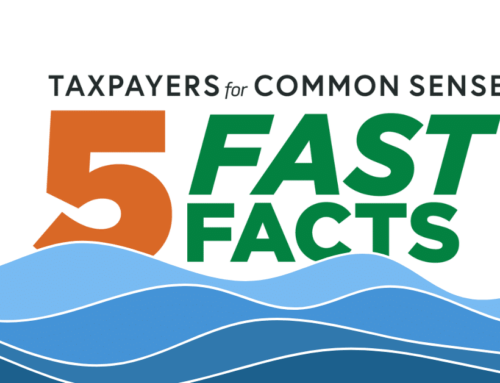Taxpayers for Common Sense, Competitive Enterprise Institute, Reason Foundation, National Taxpayers Union, and Natural Resources Defense Council sent a joint letter to members of Congress urging them to reject the unprecedented linking of onshore and offshore oil and gas revenue with the Highway Trust Fund.
Our coalition finds that creating this new revenue stream would undermine the longstanding user-pays/user-benefits highway funding principle that has guided infrastructure investment for nearly six decades. Further increasing the reliance of the Highway Trust Fund on revenue streams that are not connected to the transportation system's actual use would threaten the future health of America’s highways.
February 13, 2012
Dear Member of Congress,
The last highway bill expired more than two years ago. As Congress debates various reauthorization proposals, there are a few important aspects to keep in mind. One is preserving the user-pays/user-benefits principle. And proposals for funding the bill passed by the House Natural Resources and Ways and Means Committees last week are fundamentally at odds with this longstanding funding principle: directing royalty revenues from expanded onshore and offshore oil and gas production into the Highway Trust Fund. Further increasing the reliance of the Highway Trust Fund on revenue streams not connected to use would threaten the future health of America’s highways.
When Congress passed the Federal-Aid Highway Act of 1956, which created the modern Interstate Highway System, this was coupled with the Highway Revenue Act. The Revenue Act established the Highway Trust Fund, which authorized the Treasury to collect taxes on producers and importers of fuel, who then pass most of that tax burden on to road users. Set at a per-gallon rate, the rationale for the taxes was to link highway use with highway infrastructure investment. Prior to the creation of the Highway Trust Fund, federal-aid highways were funded out of general revenues and users did not face the costs of the infrastructure they used. In addition, all federal taxpayers (even those who did not drive) were thereby forced to pay for highways. Adhering to the user-pays/user-benefits principle is superior to general revenue funding for a number of reasons:
1. Fairness: Highway users benefit from the improvements their user taxes generate.
2. Proportionality: Users who drive more pay more.
3. Funding Predictability: Highway use and therefore highway user revenues do not fluctuate wildly in the short-run.
4. Signaling Investment: Because revenue roughly tracks use, the mechanism provides policy makers with an important signal as to how much infrastructure investment is needed to maintain a desired level of efficiency.
5. Restraining Appropriations Meddling: A provision of the 1974 Budget Act exempts the Highway Trust Fund from typical annual appropriations debates, provided that 90 percent of revenue is collected from users. The trust fund and user fees are tried-and-true policy tools for dampening political gridlock and its potentially harmful effects on our national transportation program.
For these reasons, we urge you to reject the unprecedented linkage of drilling bills with the
transportation law.
Sincerely,
Taxpayers for Common Sense (www.taxpayers.org)C
ompetitive Enterprise Institute (www.cei.org)
Reason Foundation (www.reason.org)
National Taxpayers Union (www.ntu.org)
Natural Resources Defense Council (www.nrdc.org)








Get Social